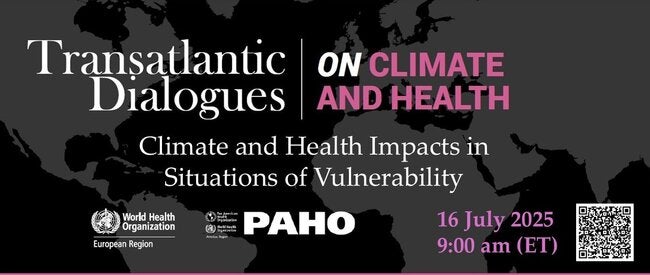REGISTER HERE
On July 16, 2025, from 9:00 am to 11:00 am (Washington DC time or EDT), join us on the Transatlantic Dialogue on Climate and Health Impacts in Situations of Vulnerability, the fourth in a series of a joint initiative by WHO/Europe and the Pan American Health Organization (PAHO).
This 4th session focuses on climate change and health equity, and will provide input to develop a summary for policy-makers on advancing health equity-oriented approaches for climate action for Member States on both sides of the Atlantic.
This Dialogue aims to:
- Share knowledge on the differential impacts of climate change among population groups across countries and regions, including exposure, vulnerability and coping capacity.
- Exchange experiences on successful interventions that integrate health equity in climate action while acknowledging common and region-specific challenges.
- Foster a collaborative dialogue and stimulate further collaboration towards actionable policy recommendations and strategies that integrate a health equity lens.
How to participate
- WHEN: Wednesday, 16 July 2025
- TIME: 9:00 a.m. (Washington, D.C., EDT), 3:00 pm (Geneve, Madrid)
- LANGUAGES: Spanish and English
Context
Climate change has become an undeniable driver of adverse health outcomes worldwide, with evidence mounting on its multifaceted impacts. However, the burden of climate-related health risks is not evenly distributed. Populations more likely to be affected are those exposed to higher risks due to social, economic and environmental factors, including socioeconomic deprivation, geographic location and occupational exposure.
Populations in situations of vulnerability (as well as children, pregnant women, older adults, ethnic minorities and those living in low-lying coastal or flood-prone areas) face disproportionate impacts, compounded by social determinants that limit their capacity to cope and adapt. This differential vulnerability underscores the critical importance of integrating health equity into climate and health action. Despite increasing awareness of these disparities, most climate–health initiatives have focused broadly on population-wide impacts, often neglecting the specific needs of populations and territories in situations of vulnerability.
Therefore, there is a necessity to take an equity-based approach, ensuring that adaptation, mitigation and resilience-building efforts explicitly address social inequities, leaving no one behind.
Agenda
Opening remarks
Dr. Jarbas Babosa. Director, Pan American Health Organization (PAHO)
Introduction to the Transatlantic Dialogue on climate change and health impacts in situations of vulnerability
Karen Polson. Climate change and health advisor, PAHO
Panel 1: Evidence of differential impact of climate change among population groups
Gabriele Bolte. WHO Collaborating Centre on Environmental Health Inequality, University of Bremen, Germany
Ana Diez Roux. Director of the Drexel Urban Health Collaborative, Drexel University, USA/Salud Urbana en Americana Latina (SALURBAL) Climate Project
Modera: Sinaia Netanyahu, Program Manager, European Centre for Environment and Health, WHO Regional Office for Europe
Questions and Answers
Panel 2: Climate action with an equity lens
Francesca De’Donato. Senior Researcher, Department of Epidemiology, Lazio Regional Health Service, Rome, Italy
Ida Knutsson, Analyst, Unit of Environmental Health, Public Health Agency of Sweden
Representative of the Government of Brazil (TBC)
Representantive of Health Canada (TBC)
Modera: Gerry Eijkemans. Director. Department of Social and Environmental Determinants for Health Equity, PAHO
Questions and Answers
Discussion on future challenges and opportunities
Gerardo Sanchez. Expert on Environment, Health and Wellbeing, European Environment Agency
Ashley Lashley. Climate Change Youth Advocate, Executive Director, Ashley Lashley Foundation
Modera: Matthias Braubachm. WHO Regional Office for Europe
Questions and Answers
Closing remarks
Daniel Buss. Unit Chief, Climate Change and Environmental Determinants of Health, PAHO
